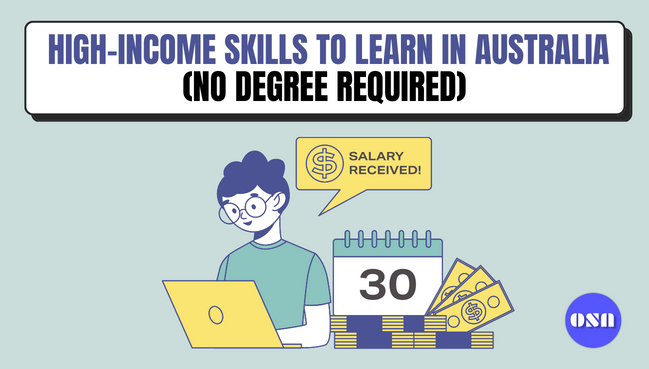Top 9 High-Income Skills to learn in 2023 and beyond in Australia (No degree required)

In Australia, there are a variety of high-income skills that do not require a traditional college or university degree.
These skills can be acquired through vocational training, on-the-job experience, or self-study, and they can lead to high-paying careers in different industries such as business, marketing, writing, information technology, etc.
In this article, we will explore some of the high-income skills to learn in 2023 and beyond in Australia.
Copywriting

What is Copywriting?
Copywriting is a high-income profession in Australia, with many opportunities for skilled writers to earn a substantial salary.
Copywriting involves creating persuasive and compelling written content for a variety of mediums, such as websites, advertising campaigns, and sales letters.
The profession has seen significant growth in recent years as businesses have shifted their focus to online marketing and advertising.
With the rise of digital marketing and e-commerce, the demand for skilled copywriters has increased, making it a lucrative career option.
To become a copywriter, you can undertake a short courses like Certificate IV in Professional Writing and Editing or Certificate IV in Marketing and Communications.
Copywriting job data in Australia
Copywriting in Australia is lucrative career with only 2000 employed workers in the industry. Also, about 59% of people who work as copywriters work full-time hours, in all their jobs combined.
The average age in the industry is recorded to be 36 years, having a 60% female share of the total population of copywriters.
Duties of a copywriter
Here are some of the major responsibilities of a copywriter:
- Writing clear, persuasive copy for advertising and marketing materials.
- Creating headlines, taglines, and other promotional text.
- Developing ideas for ad campaigns and marketing strategies.
- Collaborating with art directors, designers, and other creative professionals.
- Researching to understand target audience and industry trends.
- Revising and editing copy as needed to ensure it meets clients’ goals and guidelines.
- Keeping up with industry news, trends and best practices.
- Writing for various mediums, such as print, television, radio and digital.
- Meeting deadlines and working within budget constraints.
- Proofreading and fact-checking copy before it is published or aired.
How much does copywriter earn in Australia?
The average pay in this high-income job ranges from $65,000 to $85,000 per year. With senior copywriters can earn more than $100,000 per year.
Keep in mind that the pay in this industry is highly dependent on experience and the skill set of the person.
Social Media Management

What is a Social Media Management?
Social media management is a high-income skill profession in Australia due to the growing importance of social media in the business world.
Companies and organizations of all sizes are realizing the importance of having a strong presence on social media to reach and engage with customers, increase brand awareness, and drive sales.
According to the Labour Market Insights website, the employment of marketing and advertising professionals, including social media managers, is expected to grow strongly in the next five years.
To become a social media manager, you don’t need a degree. These days many students are doing a Diploma of Social Media marketing to become an SMM.
Social media manager job data in Australia
There are over 98,000 workers in the advertising and marketing industry in Australia, including social media managers. About 66% of social media managers work full-time hours in all their jobs.
Duties of a Social Media Manager
Here are some of the major responsibilities of a social media manager:
- Developing a social media plan that aligns with the overall marketing and business goals of the company.
- Creating and managing content for various social media platforms such as Facebook, Instagram, Twitter, LinkedIn, YouTube, and others.
- Writing and editing posts, creating graphics and curating visual content to be shared on social media platforms.
- Building and engaging with a community of followers, responding to comments and messages, and moderating user-generated content.
- Running social media campaigns and promotions to increase brand awareness, website traffic, and sales.
- Measuring and analysing the performance of social media campaigns using tools such as Google Analytics, Facebook Insights, and Hootsuite.
- Collaborating with other departments such as marketing, sales, and customer service to ensure that the social media strategy is aligned with the overall goals of the company.
- Keeping up-to-date with the latest social media trends, algorithms, and best practices to ensure that the company stays ahead of the competition.
- Creating engaging and shareable content that will perform well on different platforms.
Social media managers in Australia typically have a background in marketing, communications, or a related field, and have a strong understanding of the various social media platforms and how they can be used for marketing and advertising purposes.
How much does a social media manager earn in Australia?
The average age in the industry is recorded to be 40 years, having 61% female share and 39% male share of the total population of social media managers. The average weekly pay for this job is $1,029 per week.
UI/UX Design

What is UI/UX Design?
UI/UX Design is a high-income profession in Australia due to the growing importance of user-centered design in the tech industry.
UI/UX Designers are responsible for designing and creating user-friendly interfaces for digital products such as websites, mobile apps, and software.
They play a critical role in the development process by ensuring that the products are easy to use, visually appealing, and provide a seamless user experience.
To become a UI/UX designer, you should consider completing a short course in graphic design, web design or UI/UX.
Duties of a UI/UX Designer
A UI/UX designer’s duties may include:
- Conducting user research and analysing user feedback to understand user needs and preferences.
- Creating wireframes, mockups, and interactive prototypes of digital products.
- Developing and maintaining design systems and style guides.
- Collaborating with development teams to ensure that designs are implemented.
- Creating visual designs for digital products such as websites, mobile apps, and software.
- Ensuring that designs meet accessibility and usability.
- Continuously testing and iterating on designs to improve the user experience.
- Staying up-to-date with the latest design trends, technologies, and best practices.
- Communicating design decisions and rationale to stakeholders.
- Participating in product development meetings and providing design input on new features and functionality.
- Creating and delivering presentations to clients and stakeholders.
UI/UX job data in Australia
There are over 46,000 graphic and web designers in Australia, including UI/UX designers. About 66% of social media UI/UX designers work full-time hours in all their jobs.
The average age in the industry is recorded to be 35 years, having 51% female share and 49% male share of the total population of UI/UX designers.
How much does UI/UX designer earn in Australia?
The average salary of a UI/UX designer in Australia ranges from $105,000 to $120,000 per year, depending on the level of experience and the size of the employing company.
UI/UX Designers with more experience and a proven track record of creating successful designs tend to earn higher salaries.
Audio Editing

Who is an audio editor?
An audio editor is another high-income profession in Australia, due to the growing demand for audio content in various industries such as film, television, podcasting, and music production.
Audio editors are responsible for shaping audio recordings and ensuring they sound professional, clear, and polished.
They use specialised software to edit, mix and master audio tracks, remove unwanted noise, and add sound effects. As audio content becomes more prevalent, the demand for audio editors is expected to grow.
In order to become Audio editor, you can take short courses in Audio editing and build your portfolio.
Duties of an Audio Editor
The duties of an Audio Editor include:
- Recording, editing, and mixing audio for film, television, podcasting, music production and other audio-based projects.
- Using specialised software to manipulate and enhance audio recordings, such as Pro Tools, Adobe Audition, Logic Pro and others
- Removing unwanted noise, such as background noise, hums or clicks and pops.
- Synchronising audio with visual elements such as video or animation
- Adding sound effects and background music to enhance the audio production
- Mastering audio recordings to ensure they meet industry standards
- Collaborating with other members of the production team, including directors, producers, and other audio engineers
- Staying up-to-date with the latest audio technologies and industry trends
- Maintaining and organising audio files and backups
- Troubleshooting and solving technical issues related to audio equipment and software.
How much does an audio editor earn in Australia?
The average pay for an audio editor ranges from $70,000 to $100,000 per year.
Companies are increasingly recognising the importance of audio quality to stay competitive in the market and provide a positive user experience. This makes audio editing a high-income profession in Australia.
Drone Operator

Who is a Drone Operator?
Drone operator skills are quite technical and yield a high income when employed in different fields. Although you might not need a degree to become a drone operator, you are required to have certain certifications, licenses and experience to be relevant in the industry.
In Australia, the use of drones has become increasingly popular for a wide range of applications such as aerial photography, videography, inspection, surveying, and mapping.
With this growing demand for drone services, becoming a skilled drone operator has the potential to be a high-income skill.
Also, the mining and construction industries, agriculture and emergency services are some of the sectors that rely heavily on the usage of drones for several activities, thus providing a vast number of job opportunities for drone operators.
In order to become a drone operator in Australia, you are required to be trained and certified by the Civil Aviation Safety Authority (CASA).
Duties of a Drone Operator
The duties of a drone operator can vary depending on the specific industry or application they are working in, but generally, their duties are:
- Planning and preparing for flights: This includes conducting site assessments, reviewing weather conditions, and creating flight plans that adhere to safety guidelines and regulations.
- Operating the drone: This involves flying the drone to perform tasks such as aerial photography, videography, inspection, surveying, and mapping.
- Maintaining the drone: Performing regular maintenance and repairs on the drone, as well as ensuring that the drone is in good working condition before each flight.
- Analysing data: This involves reviewing and interpreting data collected by the drone, such as images and video footage, to identify any potential issues or areas of concern.
- Working closely with other members of the team, such as photographers or engineers, to ensure that the drone is used effectively and efficiently.
- Adhering to safety guidelines and regulations: This includes following the guidelines set by the Civil Aviation Safety Authority (CASA) and other regulatory bodies, to ensure that the drone is operated safely and responsibly.
- Keeping updated with the latest technologies and advancements in the field.
How much does a drone operator in Australia?
The average pay of a drone operator is $80,000 per year. Australia is globally recognised for drone operation and is considered to have a great prospect with a projected growth of 51.1% for drone service industry globally.
Short Form Video Editor

Who is a Short-Form Video Editor?
A short form video editor is a professional who is responsible for creating and editing short videos, typically less than 90 seconds in length.
They use various tools and techniques to craft engaging, visually appealing videos that can be used for marketing, entertainment, or educational purposes.
This includes trimming footage, adding special effects, music, and text, color correction, and more.
Examples of some popular short form video editing software include Adobe Premiere Pro, Final Cut Pro, Capcut, Inshot and so on.
In order to become a short form video editor, you will need to learn the basics of video editing software and build a portfolio by working on your own or client projects.
Duties of a Short Form Video Editor
Here are some roles of a short form video editor:
- Sourcing and organising video footage: The editor is responsible for finding the best footage to use in the final video. They may be working with raw footage from a camera crew or existing video content.
- Video Editing: The editor uses editing software to arrange the footage and create a cohesive video story. They will make cuts, add transitions, and adjust the sound and color to make the video look and sound professional.
- Story boarding: The editor may be involved in the story boarding process, which involves creating a visual plan for the video. This involves deciding on the visual style, shots, and pacing of the video.
- Sound Design: The editor may add music, sound effects, and dialogue to the video. They will also be responsible for adjusting the levels and timing of the audio to ensure it fits well with the visuals.
- Special Effects: Depending on the project, the editor may need to add special effects to the video, such as animation or green screen effects.
- Collaboration: The editor will often work closely with the director, producer, and other members of the production team to ensure the final video meets their vision.
Generally, the short form video editor is responsible for bringing the vision of the director, producer or employee to life, creating an engaging and visually stunning video that tells a compelling story.
How much does short-form video editor earn in Australia?
On average, a video editor can earn $60,000 to $75,000 per year in Australia. But since short-form editors are in high demand, you can scale this up fast.
At the moment, there is no specific data on how much short form video editors are earning in Australia.
AI Content Specialist

Who is an AI Content Specialist?
An AI content specialist is a professional who specializes in creating, managing and optimising marketing content using artificial intelligence (AI) systems.
AI content specialists create various content pieces for the business like blogs, social media captions, website copy, video scripts with help of AI.
Since the rise of AI softwares like ChatGPT, many jobs are evolving and one of that will be the content specialists that know how to use AI to maximise the content quantity and quality for the business.
The role of this job is not only to use AI to produce content but rather use it for making content creation process smoother, efficient and faster.
In order to become an AI content specialist, you need to know the basic of content marketing and knowledge of AI softwares. You can undertake a Diploma in Marketing and Communications to get basic marketing knowledge.
Duties of an AI Content Specialist
Here are some roles of an AI content specialist:
- Content creation: Developing and producing engaging and high-quality content for businesses
- Checking the AI produced content: Fact checking, citing the research sources and grammar issues for the content produced.
- Doing keyword research: Finding the keywords that businesses can create content for.
- SEO: Making sure that content is user and SEO friendly, which means it is not getting penalised for using AI assistance.
- Stay up-to-date with the latest AI technologies and trends, and continuously improve their skills to stay at the forefront of the field.
How much does AI content specialist earn in Australia?
As AI content specialist is a fairly new job role, we found out the average earning of the content specialists is $75,000 to $95,000 per year in Australia.
Big Data Analyst

Who is a Big Data Analyst?
A Big Data Analyst is a professional who is responsible for analyzing large and complex data sets to extract insights, identify patterns, and support decision-making processes in organizations.
They use various data analysis tools and techniques such as machine learning, statistical analysis, and data mining to process and interpret big data.
The goal of a Big Data Analyst is to turn raw data into meaningful and actionable information that can drive business strategies and improve organisational performance.
While some jobs might require Big data analysts to have degree, others may not. So having a degree is not a must when working as a Big Data analyst.
In order to become a Big Data Analyst, you can get started with the Data Analyst certification courses. These courses are foundation courses to get into the industry without a degree.
Duties of a Big Data Analyst
Here are some roles of a Big Data Analyst:
- Collecting and processing large and complex data sets from various sources such as databases, cloud platforms, and social media.
- Cleaning, transforming, and preprocessing data to ensure its quality and accuracy.
- Using various data analysis tools and techniques such as machine learning, statistical analysis, and data mining to uncover insights and patterns in the data.
- Visualising data to support data-driven decision-making and communicate findings to stakeholders.
- Building predictive models and forecasting trends based on historical data.
- Identifying and addressing data quality issues and recommending solutions to improve data accuracy.
- Developing dashboards and reports to monitor key performance indicators and provide ongoing updates to stakeholders.
- Collaborating with cross-functional teams such as data engineers, software developers, and business leaders to ensure that data analysis aligns with business objectives.
- Staying up-to-date with the latest advancements in big data technologies and tools, and incorporating these advancements into data analysis processes.
The general role of a Big Data Analyst is to convert vast amounts of raw data into meaningful information that can be used to make informed business decisions and drive organizational success.
How much does big data analyst earn in Australia?
According to Seek, on average, Big Data Analysts can earn $90,000 to $110,000 per year. Again, your income will vary based on expertise, qualifications and employer.
Cloud Engineer

Who is a Cloud Engineer?
A Cloud Engineer is a professional who designs, develops, implements, and manages cloud-based systems and applications.
They are responsible for implementing and maintaining cloud infrastructure, ensuring that cloud services meet business requirements, and performing ongoing administration and maintenance tasks.
The cloud engineer must have a deep understanding of cloud computing and its underlying technologies, as well as experience with cloud services such as Amazon Web Services (AWS), Microsoft Azure, and Google Cloud Platform.
They must also have strong experience with virtualisation, network security, and data management.
To become a cloud engineer, you will need to undertake foundation courses like a Diploma in information technology and complete the certifications like AWS etc., and build your portfolio.
Duties of a Cloud Engineer
Here are some roles of a Cloud Engineer:
- Design and implementation of cloud architecture: Cloud Engineers work with stakeholders to design, implement, and manage cloud computing systems that meet the organization’s needs.
- Deployment and management of cloud infrastructure: Cloud Engineers deploy and manage cloud-based infrastructure, including virtual machines, storage, and networking, to ensure the availability and scalability of cloud services.
- Automation of cloud infrastructure: Cloud Engineers automate the deployment, configuration, and management of cloud infrastructure using tools such as Terraform, Ansible, or CloudFormation.
- Security and compliance: Cloud Engineers ensure the security and compliance of cloud services by implementing security controls and policies, performing regular security audits, and ensuring that all cloud deployments are in compliance with industry standards and regulations.
- Performance monitoring and optimization: Cloud Engineers monitor the performance of cloud services and identify and resolve performance issues to ensure that cloud services are fast and reliable.
- Technical support: Cloud Engineers provide technical support to users of cloud services, troubleshoot issues, and resolve problems to ensure the smooth operation of cloud services.
The general role of a cloud engineer is to manage and ensure cloud services are running optimally.
How much does cloud engineer earn in Australia?
On average, cloud engineers can earn $105,000 to $150,000 per year. Earnings in this industry largely depend on expertise, qualification and employer.
Conclusion
So these are our pick of Top high-income skills to hone in 2023 and beyond.
Although a degree isn’t necessary to explore these career options, you must have the appropriate skills and experience for these jobs to successfully enter and maintain relevance.
Also, regularly updating your knowledge in a related field or industry can help increase your chances of getting high pay.


